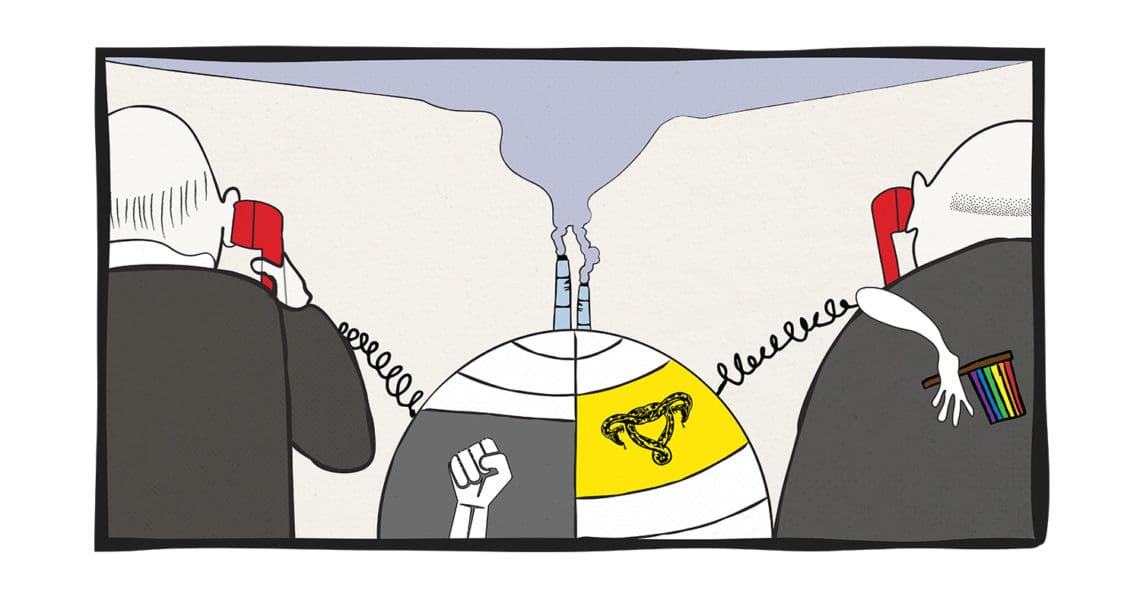You don’t know me, and I don’t know you — not really. But I do know you read this site and that’s because I work here. I know that you are responsible for some aspect of corporate compliance or risk management or one of the dozen other areas we cover.
If you’d asked me two years ago what corporate compliance professionals care about, I probably would have said something like, “Why are you asking me this question? How should I know?” Then, my understanding of corporate compliance and its myriad branching subtopics was limited to knowing those two words existed in that combination and that lots of federal agency acronyms were involved somehow.
To be sure, that’s still true — reading our site sometimes feels like looking at a bowl of alphabet soup. But one of the things I have learned is that there are several major movements underway in corporate compliance that have to do more with bettering society than I could have imagined and, disturbingly for me, they represent the only hope for progress this country has left.
Another tidbit about me is that the first presidential election I voted in was in 2000 — the year of Bush v. Gore and hanging chads and endless recounts. I worked for my college newspaper at the time and wrote a column urging my classmates who might otherwise have preferred Ralph Nader to be pragmatic and vote instead for Al Gore.
The intervening years have only made me more of a lefty, and today I reside somewhere between Che Guevera and Elizabeth Warren. So you can imagine my surprise when I took to my computer and began to pitch a column to my publisher suggesting that perhaps corporations are the only ones who could save us from our government institutions.
This was about a week on from the Supreme Court overturning Roe v. Wade, the day that same body indicated certain federal regulators (they of the alphabet soup) couldn’t legally claim the authority they use to, well, regulate. (The court struck down an EPA rule that would have required power plants to lower carbon emissions or begin adopting renewable energy.)
The immediate implications of that decision are bad enough news on a planet in which the past eight years have been the eight hottest on record. But taken together with other recent judicial decisions, including a U.S. Court of Appeals ruling that criticized the SEC’s use of administrative law judges, it’s pretty easy to see why people closer to my political persuasion are concerned about the regulatory and administrative apparatus of the United States being dismantled.
Now, those decisions don’t really affect my job every day, but they might affect yours. If not today, then at some point in the future when they are used to, say, argue that no federal agency has the power to issue any regulations or even enforce the ones they’ve already issued.
Not long after the court’s decision in Dobbs v. Jackson Women’s Health Organization, and, indeed, once the draft opinion was leaked a few months ago, corporations began rushing to inform their workers and the public that they would pay for or reimburse expenses for employees who have to travel out of state to seek abortions.
The additional HR compliance issues those policies will certainly create aside, at least these companies are doing something. But reproductive justice is not the only movement at risk; in fact, legal scholars have indicated marriage equality and other protections not covered by specific legislation could be next to fall.
Privacy rights. A healthy environment. Equal access to opportunity. These are all things that most people want, and until recent years and months, it seemed perhaps that we were moving in the right direction.
I’m not naïve enough to believe that companies’ ESG or DEI programs are purely altruistic. Businesses are, of course, profit-motivated and, in part, many of them are responsible for climate change in the first place. (A 2017 study found that 71 percent of global emissions could be traced to just 100 companies.)
But the U.S. military produces more pollution than the entire country of Portugal, and very little seems to be getting done about that, so as crazy as it looks to my leftist eyes to write this, soulless corporations are providing more leadership on these issues than those the people elected (or those appointed). And for the sake of our planet’s future, they need to keep leading.
Here, I must cop to the misdirection in our headline: I don’t love the corporation (except the one I work for, of course). But if corporate America can somehow find its way to continue efforts at materially improving the lives of people around the world, then I don’t know. I’m a romantic, after all; anything is possible. That’s because in covering their asses, they’re also saving ours.



 Jennifer L. Gaskin is editorial director of Corporate Compliance Insights. A newsroom-forged journalist, she began her career in community newspapers. Her first assignment was covering a county council meeting where the main agenda item was whether the clerk’s office needed a new printer (it did). Starting with her early days at small local papers, Jennifer has worked as a reporter, photographer, copy editor, page designer, manager and more. She joined the staff of Corporate Compliance Insights in 2021.
Jennifer L. Gaskin is editorial director of Corporate Compliance Insights. A newsroom-forged journalist, she began her career in community newspapers. Her first assignment was covering a county council meeting where the main agenda item was whether the clerk’s office needed a new printer (it did). Starting with her early days at small local papers, Jennifer has worked as a reporter, photographer, copy editor, page designer, manager and more. She joined the staff of Corporate Compliance Insights in 2021.







